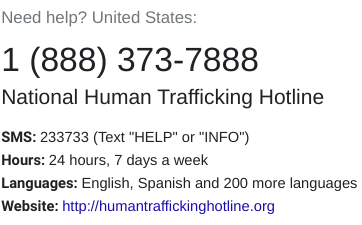Tips To Stay Safe and Avoid Human Trafficking

Human Trafficking hotline information
November 10, 2022
So we’re sure you know what human trafficking is. For those who don’t know, human trafficking involves the use of force, fraud, or coercion to obtain some type of labor or commercial sex act. With an estimated 24.9 million victims worldwide at any given time, it is quite clear that human trafficking is quite a problem. Human traffickers prey on adults and children of all ages, backgrounds, and nationalities so nothing prevents you from being human trafficked. Well… there are a few things that may help prevent you from it. What are these things you ask? Well, by knowing the precautions you can take to prevent human trafficking is a good way to start.
While anyone can be human trafficked, some are more vulnerable than others. For example, those who:
- Have an unstable living situation
- Have previously experienced other forms of violence such as sexual abuse or domestic violence
- Have run away or are involved in the juvenile justice or child welfare system
- Are undocumented immigrants
- Are facing poverty or economic need
- Have a caregiver or family member who has a substance use issue
- Are addicted to drugs or alcohol
Maybe more vulnerable than others when it comes to being human-trafficked.
Another thing is that to know how human traffickers lure people in, examples of such ways could be:
- A would-be employer refuses to give workers a signed contract or asks them to sign a contract in a language they can’t read.
- A would-be employer collects fees from a potential worker for the “opportunity” to work in a particular job.
- A friend, family member, co-worker, or student is newly showered with gifts or money or otherwise becomes involved in an overwhelming, fast-moving, and asymmetric (e.g., a large difference in age or financial status) romantic relationship.
- A friend, family member, or student is a frequent runaway and may be staying with someone who is not their parent or guardian.
- A family member, friend, co-worker, or student is developing a relationship that seems too close with someone they know solely on social media.
- A family member, friend, or student lives with a parent or guardian and shows signs of abuse.
- A family member, friend, or co-worker is offered a job opportunity that seems too good to be true.
- A family member, friend, or co-worker is recruited for an opportunity that requires them to move far away, but their recruiter or prospective employer avoids answering their questions or is reluctant to provide detailed information about the job.
It’s also important to recognize the two main types of human traffickers which are Labor Traffickers, labor trafficking includes situations where men, women, and children are forced to work because of debt, immigration status, threats, and violence. Keeping victims isolated — physically or emotionally — is a key method of control in most labor trafficking situations. But that does not mean you never cross paths with someone who is experiencing trafficking; and Sex trafficking, Sex trafficking is the recruitment, harboring, transportation, provision, obtaining, patronizing, or soliciting of a person for a commercial sex act.
Signs of labor trafficking are:
- Feeling pressured by their employer to stay in a job or situation they want to leave
- Owe money to an employer or recruiter or are not being paid what they were promised or are owed
- Do not have control of their passport or other identity documents
- Are living and working in isolated conditions, largely cut off from interaction with others or support systems
- Appear to be monitored by another person when talking or interacting with others
- Are being threatened by their boss with deportation or other harm
- Are working in dangerous conditions without proper safety gear, training, adequate breaks, or other protections
- Are living in dangerous, overcrowded, or inhumane conditions provided by an employer
Signs of Sex Trafficking are:
- Wanting to stop participating in commercial sex but feel scared or unable to leave the situation.
- Disclose that they were reluctant to engage in commercial sex but that someone pressured them into it.
- Live where they work or are transported by guards between home and workplace.
- Are children who live with or are dependent on a family member with a substance use problem or who is abusive?
- Have a “pimp” or “manager” in the commercial sex industry.
- Work in an industry where it may be common to be pressured into performing sex acts for money, such as a strip club, illicit cantina, go-go bar, or illicit massage business.
- Have a controlling parent, guardian, romantic partner, or “sponsor” who will not allow them to meet or speak with anyone alone or who monitors their movements, spending, or communications.
There are many other things you can do to keep yourself and others from being human trafficked and we encourage you to research it to better understand what you can do!

